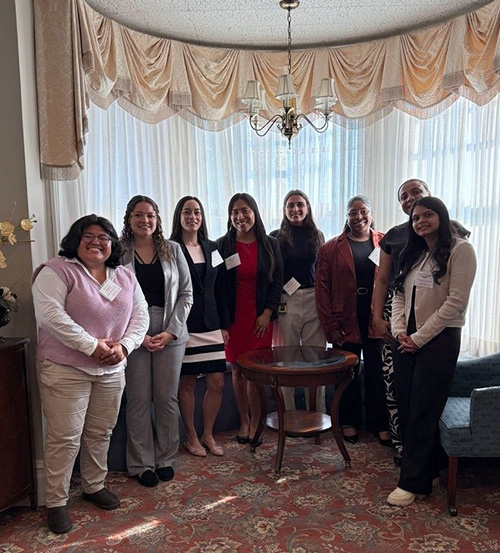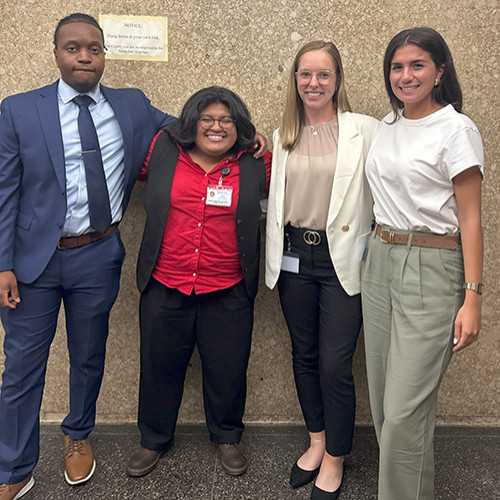
Widener Law Commonwealth Student Gains Career Insight, Community Through Camp 1L
For many law students, the first summer after their first year, known as 1L, can feel like stepping into the unknown. For Widener University Commonwealth Law School student Andrea Hernandez-Rodriguez, that summer became an opportunity to gain real-world experience, build confidence, and create meaningful connections through Camp 1L—an eight-week program offered by the Dauphin County Bar Association, known as DCBA.
Camp 1L places first-year students in paid internships with local law firms, government agencies and judges. Its mission is simple: to open doors for aspiring lawyers and provide students—especially those who may not have an established network—with the tools and relationships to succeed.
The program launched in 2004 as part of the Capital Area Managing Partners’ Diversity Initiative, a collaborative effort by leading law firms and bar associations to expand opportunities in central Pennsylvania for first-generation law students and those from typically underrepresented backgrounds. Today, it continues to be overseen by the DCBA’s Equal Professional Opportunity Committee.
“It was comforting to see that the DCBA is intentional about creating opportunities for students from underrepresented backgrounds,” Hernandez-Rodriguez said. “I remember attending an info session and thinking, ‘This is what I need.’ At the time, a lot of my classmates were already talking about internships and career paths, and I felt a little lost. I wasn’t sure where to start, let alone what kind of law I wanted to practice. Camp 1L felt like a guided and thoughtful way to explore the profession without feeling like I had to have it all figured out.”
The application process is competitive, requiring a cover letter, résumé, writing sample, and a statement on how applicants would contribute to access and opportunity in central Pennsylvania’s legal community. Interviews follow, and placements are determined based on a match between the student’s strengths and the needs of the participating firms or courts.
 Hernandez-Rodriguez was selected and placed with Judge Royce L. Morris of the Dauphin County Court of Common Pleas, where her days were packed with courtroom observations and legal writing assignments.
Hernandez-Rodriguez was selected and placed with Judge Royce L. Morris of the Dauphin County Court of Common Pleas, where her days were packed with courtroom observations and legal writing assignments.
“I usually start around 7:45 a.m. and review the court schedule for the day,” she said. “Some mornings I’d watch jury selections. Other days, I’d sit in on juvenile hearings or sentencing proceedings. During trial weeks, we observed everything from opening statements to closing arguments.”
One standout moment for her came during a two-day criminal trial. “We became completely invested,” she said, smiling. “After every recess, the other interns and I couldn’t stop debating testimony and trying to predict what the attorneys would do next. The verdict didn’t feel like the most important part—it was the discussion, the critical thinking, and the conversation with Judge Morris afterward that made it so rewarding.”
Beyond courtroom work, Hernandez-Rodriguez attended weekly professional development sessions hosted by the DCBA and local law firms. “These sessions gave us exposure to so many practice areas—public utility law, environmental law, family law—you name it,” she said. “It’s also where we networked with attorneys and judges. Those relationships are invaluable.”
Her experience wasn’t limited to observation. Hernandez-Rodriguez drafted briefs on topics such as Pennsylvania’s Accelerated Rehabilitative Disposition program for cases involving charges of driving under the influence. “Assignments like that really deepened my understanding of how cases move through the system,” she said.
For Angel Cox, another rising second-year student, Camp 1L was equally transformative, though her experience unfolded at Thomas, Thomas & Hafer, a regional law firm.
“I researched, wrote motions and supporting briefs, attended depositions, and even observed a mediation in York County,” Cox said. “That stood out because I’d worked on that case beforehand, so seeing how everything came together in real time was eye-opening. It also taught me how much of the law happens outside the courtroom.”Both students say Camp 1L has given them more than just experience—it has given them perspective.
“One thing that surprised me is how much you don’t learn in law school until you’re in the field,” Hernandez-Rodriguez said. “The procedural steps, the filings, the nuances—you only get that through hands-on exposure.”
Cox agrees, adding that the program revealed just how flexible a law degree can be. “Coming in, I thought I knew exactly what I wanted—criminal defense and business law—but now I’m more open than ever,” she said.
Hernandez-Rodriguez feels the same way. “I’m keeping an open mind,” she said. “There’s still so much to learn. But now I have mentors, a network, and a clearer picture of what this profession really looks like.” Her advice to other students considering Camp 1L? “Apply,” she said without hesitation. “This program doesn’t just teach you about the law—it shows you where you belong in it.”
